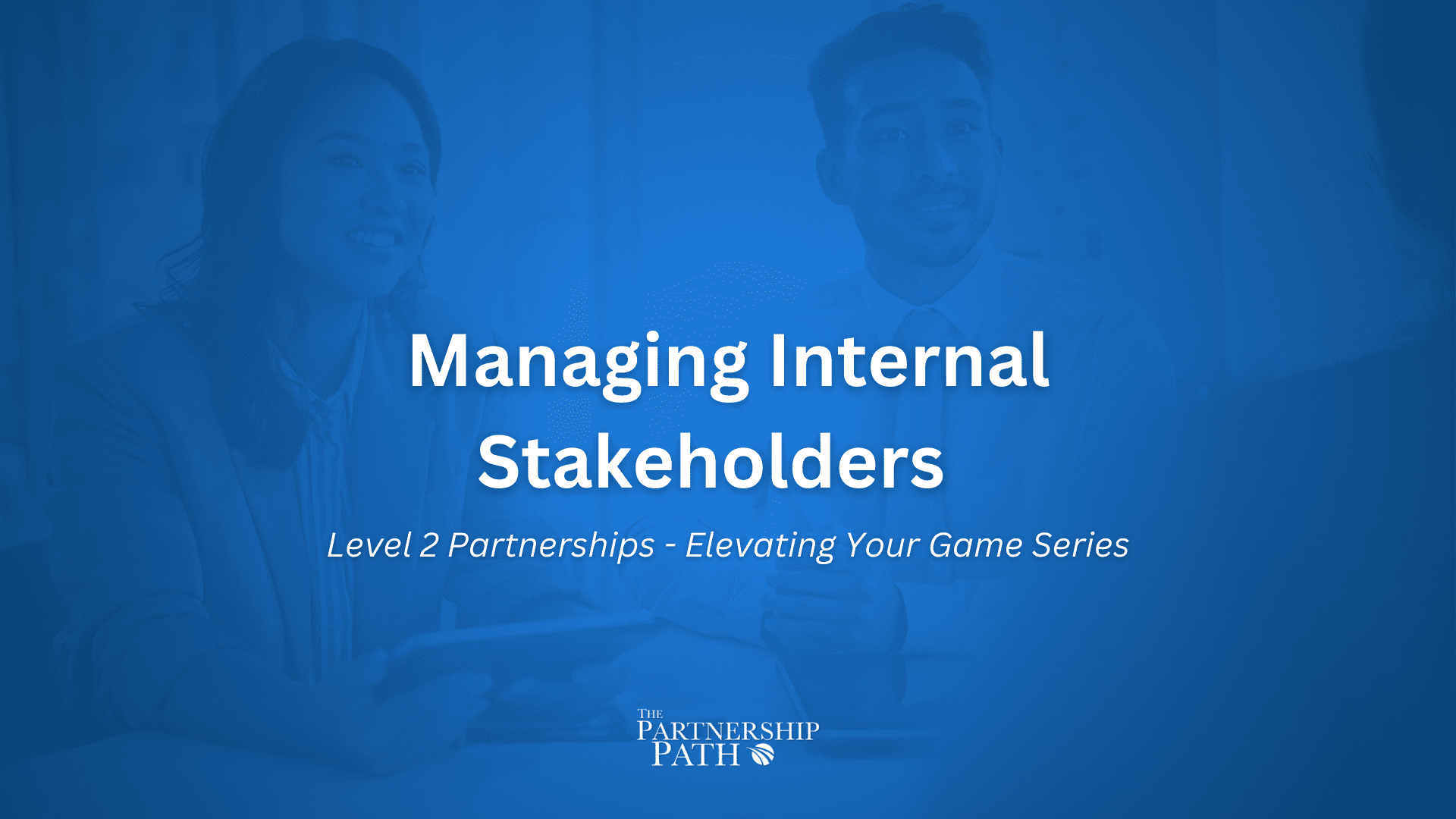Salena Butler @Infor On Being a Virtual Sales Manager
Episode Summary
In the latest episode of “The Partnership Path, we dive deep into the world of partner sales management with the seasoned expert, Selena Butler. With over two decades of experience in the field, Selena shares her invaluable insights on building trust, fostering collaboration, and driving success in both direct and partner sales environments. Her unique perspective, shaped by her extensive background in companies like Epicor and Infor Software, offers a rich tapestry of knowledge for anyone navigating the complex landscape of sales and partnerships.
Transcript
John: Well, welcome to the Partnership Path in Real Life. Selena Butler, I’m so excited to have you on the podcast with me. It’s been a while since we’ve had a chance to talk, but we have done a lot of things together. So I am super excited to get your perspective on this. But before we get into it, let me give you a chance to introduce yourself to our listeners. Tell us a little bit about where you’re working, what you do, and how long you’ve been engaged with partners in particular.
Salena: Yeah, well, thank you, John. So good to see you again. And yes, we’ve had many years working together. So what a great opportunity to come here and speak with you today. Yeah, so Selena Butler, I’ve been in application business sales for 20 years. I spent my career really building ecosystems, also working with direct sales organizations. I’ve worked at companies like Apple Core Software. I’m currently at Infor Software. And yeah, I really built my career around working with partners.
John: Yeah, look, one of the things I love about your background, Selena, is this mix of direct and partner. We have lots of people who come on the show who either have one or the other. And having that sort of integration, you see it from both sides. And I think even now, you’re managing both sides of that business. And so it’s such a good perspective to have. So I’m anxious to hear how that kind of influences what we talk a little bit about today, which is we just did this episode, Tony and I just did this episode on, you know, kind of being a virtual sales manager. How do you try to help in particular, like channel partners, maybe who don’t have as much sales experience as we might have kind of helping them by being a, you know, a coach and a virtual sales manager to them. So I’m anxious to hear someone who’s been both direct and partner. What’d you think of that episode? What kind of stood out to you, both good or bad? What’s your reaction to that?
Salena: No. Yeah, it’s a fascinating subject because at the end of the day, we’re trying to accomplish similar goals working with a direct sales organization and really a partner organization. But there’s one very stark difference. These partners do not work for you. Right. So it’s how do you get to the point where you have that trust and credibility with the goal of getting better together? So trying to break down the walls where you’re really establishing a common language and also, you know, have humility. So partners know that you’re there to help guide them for the better of your partnership. It’s not a let me interrogate you on your deal type of relationship. Right. And if I think back in my career, going back however many years, it doesn’t matter. Right. It has kind of changed. Right. Where it was more of an interrogation, let me try to stump you on your deal. And then on the reverse side, the sales rep may be looking at it and saying, well, I’m going to try to paint a really good picture. Because I remember doing that, sitting in that seat, where as a channel manager, right, it’s a completely different approach that we’ve tried to bring to market that I think some of our channel managers are just really excelling in.
John: Yeah, yeah, you know that that differentiation I think is so key and I think it’s one of the most interesting things in particular this combo background that you have, right? Because I would be willing to bet that the efforts you and your team have to put into being good sales coaches with partners, people who don’t work for you has actually made you a better direct sales manager sales coach with the people who do work for you for that very reason of when they work for you, it’s a little bit easier to be an interrogator. But you can’t do that when they don’t work for you. And so I’m sure that that must have some sort of flow over between the two. Talk to me a little bit about how you encourage your leaders, your managers, your partner people to make it more conversational, to make it less interrogatory, whatever the word is, less of an interrogative. Yeah. How do you do that?
Salena: Yeah. Interrogating. Yes. Yes, absolutely. So yeah, so it certainly does not happen overnight, right? I mean, it is getting back to kind of my first points around building trust and credibility. I think some channel managers do that at a different rate. And it really depends on the personality of the partner, the personality of the channel manager. And what we try to do is if we can, we try to match up those portfolios so we can kind of get some commonality, if you will, to break down those bridges and then have, you know, establish that common language and leverage that trust. So it’s fun then to see channel managers that have accomplished that where they’ve done that through steps like giving back to the partner as far as sharing their experiences or suggestions like have you possibly tried this or I’ve tried this in the past. And again, just approaching it in a completely different way where you can just take down that intensity because you’re just trying to figure out what are the gaps in a deal against speaking the common language to go and get after it together.
John: Yeah, yeah, that whole conversation that Tony and I had around really trying to identify the risk, right? Where are we collectively at risk in this deal? Not where have you not done your job, but where have we collectively maybe missed a piece of information or forgot to ask the right question or not said the right thing? And then what do we do about it? How can I help you do the right thing?
Salena: Exactly.
Salena: Yeah, and you brought us an interesting point, too. I mean, there are a million different sales processes out there, and it doesn’t really matter what you believe in or what you kind of bring from each of those areas. It’s again, taking maybe what you know, maybe what the partner knows, meeting them where they’re at to figure out what is that common language. And then again, like you mentioned, it’s all about identifying those gaps for just the sake of moving.
John: Yeah.
Salena: Derisking a deal, right, and deciding to move forward or not. Yeah.
John: Yeah. Right. Yeah. Yeah. What in fact, so Tony and I talked a little bit about my, you know, I’ve got these eight categories that I like to use when I’m doing either partner deal reviews or direct reviews. How does that resonate with you and some of your experience with some of these partners? Like, is that having like, you know, kind of coming to the table with like a sort of these are the things I normally go after. You know, would you recommend that or would you recommend, you know, kind of starting with a blank sheet of paper with the partner? What’s your recommendation on the best way to find that common language?
Salena: Yeah, what, how I’ve typically approached it is just to seek to understand maybe what the partner is using today. Maybe they have rolled out MedPic internally and they’re leveraging that and having great success. Well then maybe that’s the right framework, right? Or maybe partner again, meeting them where they’re at, maybe they have nothing. So there it’s really an opportunity to bring some of that knowledge to bear along with experiences. And again, getting back to my first point, that’s where the trust and credibility starts to go right up, right?
John: Yeah. Yeah. Yeah. If you can bring, if you can bring something to a partner who doesn’t already have it, and, and presented in a way that doesn’t feel like you’re mandating it, right? That, that doesn’t feel like you’re saying you must do it this way. It’s a huge trust builder, right? That’s a huge way to get them to feel like, maybe you are on the same side as me.
Salena: Yes.
Salena: Yeah, I agree. And that’s one of the things we were asked more than anything is tell me what what is working with other partners businesses or what’s working with you as a vendor that we can then kind of partner eyes. Right. So bringing those examples to partners for them to to kind of figure out what journey works for them is what’s really worked well. I think also putting yourself in the partner’s shoes when you approach a coaching session or a deal review. And then just layering in not only how can you help as a channel manager with the goal of enabling for scalability, right? Because you certainly don’t want to get stuck in the point where you’re their sales rep and that can happen quickly. And you have many great educational sessions on how to not let that happen.
John: Yeah. Yeah. Yeah. Right. Right.
Salena: But I think there’s a fine line there on some different levers that you can pull to build the credibility, maybe lead by example. And then hopefully they’re taking that and then you can get the scale.
John: Yeah, that raises a good point and a good question. I’d be curious. I have my own thoughts from a training perspective on this. But in real life, how do you help your channel managers, your partner managers sort of deal with the accountability issue? Because doing a good deal review is great. But coming out of that, if you have a set of, hey, here’s what you’re gonna do, here’s what I’m gonna do, and the partner side doesn’t do that, how do you start to drive some accountability in that, again, with a group that doesn’t actually work for you?
Salena: Right. So that is also difficult. And I think where we find success with partners that are feeling that accountability is again when they value the channel manager partnering with them. Like, okay, if we do that this way, we’re gonna get to this goal. So some of our most successful partners are engaged and see the benefits of their interaction and partnerships with the channel manager. If we’re not seeing that, then we may, we might have a partner that falls into the category of having a conversation, meaning are they really the right partner? Are they the right person, right?
John: Right. Right. Yeah.
Salena: So, and having that conversation with them. So it’s not just checking the box. Do we have a partner? Are they getting certified? But are they actually taking, you know, the suggestions, the coaching and doing anything with it? And then if not, why? And maybe having a tough conversation around whether that is the right partner that we want to invest time and energy into.
John: Yeah, absolutely. And I think that’s a key piece, right? Being able to have that honest conversation with a partner and say, “Look, we’re here to support you. We’re here to help you grow your business and our business together, but it has to be a two-way street.” If the partner is not willing to put in the work or make the changes necessary, then it might be time to reassess that relationship. And that’s a tough call to make, but it’s necessary for the health of the overall partner ecosystem.
Salena: Yeah, absolutely. And I think it’s also about showing the partner the value of what you’re bringing to the table. If they can see that the guidance and support you’re providing is actually leading to success, they’re more likely to buy in and follow through on their commitments. It’s about creating a win-win situation where both sides see the benefit.
John: Yeah, that makes a lot of sense. So shifting gears a little bit, one of the things we talked about in the episode was the importance of communication and how critical it is to keep lines of communication open with your partners. How do you ensure that you’re maintaining strong communication with your partners? What strategies do you use to keep that dialogue going?
Salena: Yeah, communication is absolutely key. We have regular check-ins with our partners, both formal and informal. Formal check-ins might include quarterly business reviews where we sit down and really dive into the numbers, the pipeline, what’s working, what’s not. But we also make sure to have more informal touchpoints, whether that’s a quick call to check in or an email to share some relevant information. It’s about making sure that the partner knows you’re there for them and that you’re engaged in their success.
John: Yeah, those informal touchpoints can be really powerful. It shows that you’re thinking about them and their business even outside of the scheduled meetings. It helps build that relationship and trust.
Salena: Exactly. And it goes both ways. We encourage our partners to reach out to us anytime they need support or have questions. It’s not just about us pushing information to them, but also being open and available for them to pull information from us as needed. That two-way communication is really important.
John: Absolutely. So, as we wrap up, what would be your top piece of advice for someone who’s new to managing partner relationships? What’s the one thing they should focus on to be successful?
Salena: I would say, focus on building trust and credibility from day one. Be transparent, be supportive, and always look for ways to add value to the partnership. It’s not about you; it’s about how you can help your partner succeed. If you can do that, everything else will follow.
John: Great advice. Well, Salena, thank you so much for joining us today. It’s been a fantastic conversation, and I know our listeners will get a lot out of it.
Salena: Thank you, John. It was a pleasure being here and discussing these important topics with you.
John: All right, folks, that’s it for today’s episode of the Partnership Path in Real Life. Thanks for tuning in, and we’ll see you next time.
Key Takeaways
- Building Trust and Credibility: Establishing trust is paramount in managing partner relationships. Timely responses, transparency, and a genuine interest in the partner’s success are crucial.
- Tailoring Approaches: Understand and adapt to the partner’s existing sales frameworks. Meeting partners where they are and integrating their methods fosters better collaboration.
- Measuring and Celebrating Success: Continuously evaluate what’s working and what’s not. Celebrate joint successes to maintain motivation and strengthen the partnership.



